- Home
- David Levithan
The Mysterious Disappearance of Aidan S. (as told to his brother) Page 13
The Mysterious Disappearance of Aidan S. (as told to his brother) Read online
Page 13
Officer Pinkus showed up at four o’clock. I was relieved to see there weren’t any other officers with her.
“As promised, just a check-in,” she assured my parents. “We haven’t seen any other unusual activity. Mr. Risen is now back in his care facility and knows not to enter any other schools.” It took me a moment to realize that Mr. Risen was Zeke.
After Mom and Dad made some small talk with Officer Pinkus, she suggested we all sit down.
“Actually,” Aidan said, “can Lucas and I talk to you alone for a moment?”
All the adults in the room seemed surprised by this, but Mom and Dad let Officer Pinkus take the lead.
“Sure,” she said. “Where should we go?”
“How about the attic?” Aidan suggested.
Mom and Dad exchanged a glance. But Officer Pinkus was already leading the way.
Aidan and I followed.
41
Aidan sat on the chest. I sat on the floor. Officer Pinkus sat on the edge of the rocking chair, so it wouldn’t rock. The dresser stood in its usual place.
“I have something to tell you,” Aidan said. Then he corrected, “We have something to tell you.”
I thought this meant I’d share some of the storytelling. But once Aidan started, he didn’t leave any room for me. He started by explaining to her how much he loved gaming, about how excited he’d been to go to the gaming convention—and how sure he’d been that his parents wouldn’t let him go during school. From there, he told the whole story, just as we’d put it together the night before. Officer Pinkus took some notes, but mostly she listened.
“I’m really sorry I lied,” he said at the end. “It started out with me doing something wrong, and then it just got worse and worse. I didn’t mean to scare so many people. I feel awful about it.”
“I’m sorry too,” I added. “For what I did.”
“I see,” Officer Pinkus said, putting her notebook aside. “Now do you mind if I ask you a few questions?”
“Sure,” Aidan said, totally calm.
“Okay. Let me start with this one: How did you call home, Aidan?”
Aidan’s calm edged a little further away. “What do you mean?”
“You left your phone here. How did you call home?”
“I used a phone at the hotel.”
“Where in the hotel?”
“Where there were phones? Like, public phones.”
“Are you saying there are pay phones in the hotel?”
“Yeah.”
“You’re sure I’ll find pay phones there?”
Aidan nodded.
“And when I check the records for those pay phones, I’ll find calls to this house.”
“Yes,” Aidan said. But it sounded like he was saying it because he had to.
“What costume did you bring?”
“What?”
“You said you went in costume. What was the costume?”
“Um…Super Mario?”
“You wore the same costume every day.”
“Yes?”
“And did you shower?”
“No?”
“You said your wallet was stolen?”
“Yes.”
“Then how did we find your wallet in your room while you were gone?”
“He had a second wallet!” I jumped in when it looked like Aidan didn’t have an answer.
“Okay, look,” Officer Pinkus said. “I could very easily check every aspect of your story. Phone records. Security footage at the hotel. I could talk to the organizers of this convention and see if there was any way in without a badge; I’m guessing the answer’s no. Or, Aidan, I could ask you to describe the convention and the hotel. You were there for three or four days, after all. I’m sure you can tell me all about it.”
Aidan seemed to be shrinking into the shadows. He wasn’t going to say no, but he had also run out of yes.
Officer Pinkus rocked forward to us.
“Here’s the thing—you seemed much, much more genuine when you were talking about Aveinieu. Even though most people think it’s impossible, I believe that much more than I believe what you’re saying now. I’m sure you have your reasons, and I can probably guess at what those reasons are, but for a minute I need the old Aidan back, the one who wasn’t lying to me. Do you understand?”
Aidan nodded.
“I’m going to ask you two questions again. And you need to give me the honest answers. First, were you kidnapped?”
“No,” Aidan said clearly.
“Second, even if you weren’t kidnapped, did you leave here to meet up with anyone?”
“No.”
“Nobody helped you.”
“No.”
“Not even Lucas?”
Aidan shook his head. “Not even Lucas. I ran away. I was alone. And then I came back. Alone.”
Now it was Officer Pinkus who nodded. Then she sat back for a second, decided something, and rocked again toward us.
“When I was fourteen,” she said, “my older sister ran away. She did it to be with a boy who wasn’t good for her. We’d all warned her about him; she wouldn’t listen. So she left, and it ended very badly. I never saw her again. Which is why I do what I do…and why you need to listen to me now. Got it?”
“Got it,” Aidan and I both said.
“Good. As long as no one hurt you, the only thing that matters now is that you’re back. And the only thing that matters going forward is that you don’t run away again. This doesn’t just matter to me; it matters to your parents, your town, your friends. Stay here. And if you ever get the feeling you want to run away again, talk to someone about it. Because running away without a word is never going to be the answer to your problems; it will only cause more problems. There are certainly kids out there who need to be in a better place than the home they’ve been given—but you’re not one of those kids. You are a kid who is surrounded by love. You might not see it all the time—none of us ever do. But it’s there. Whenever you need to reach for it, reach for it, because it’s there. Do you feel that?”
“Yes,” Aidan said.
“And do you promise not to disappear again?” Officer Pinkus gestured toward the dresser. “For whatever reason.”
Aidan didn’t look to the dresser. He looked straight at Officer Pinkus.
“I promise.”
She stood up then and told us, “As far as I’m concerned, this case is now closed. I will tell your parents that. I will say that to anyone who asks. I loathe the fact that it was our lapse that put your story out there in the first place. But now it’s yours again, and you don’t have to do anything else with it if you don’t want to. If you end up having more to tell me, my door will always be open to you. Never make up things because you think they’re what people want to hear. Most of the time when you do that, you end up being wrong.”
Aidan and I stood up too. Officer Pinkus offered her hand, and one after the other, we shook it.
Before she left the attic, she took a look around, then said to us, “There’s no place like home, right?”
And we agreed.
There’s no place like home.
42
True to her word, Officer Pinkus told Mom and Dad that the case was closed and they needed to start treating it that way too.
“What’s important is that he’s back,” she said. And they repeated it.
The fact that it didn’t matter where he’d been was unspoken, but understood.
* * *
—
Aidan and I had an intense conversation before bed that night, and over the next few weeks talking before bed became something like a tradition. Not about Aveinieu, but about other things. Once I’d proven my belief in him, it carried over to other things. Which made life easier for both of us, to be a
ble to talk about it.
He stayed friends with Glenn, but not really best friends. His friend group grew pretty big, and even included Kelli and Keegan. Every now and then, someone made a unicorn joke, but mostly people stayed away from it. It was too weird, too unusual to deal with. So it stopped being what they thought about when they thought about Aidan. He tried to do lots of other things—he joined track, started singing in the school chorus—to define himself more.
About a month after the case was closed, Mom and Dad drove us into the city for a day with Aunt Brandi. She’d found a gamer con that she thought Aidan and I would like, one that was aimed at teens and kids. It was actually thrown by the same organization as the one Aidan had pretended to go to, in the same hotel. Of course, Brandi had no way of knowing that. She also didn’t understand why we were on the hunt for pay phones.
We didn’t find any.
But Aidan did find something else. Because two of Brandi’s friends came along with their own kids. And one of those kids was a boy Aidan’s age named Luther. From the moment they started talking, it was clear they weren’t going to stop talking anytime soon. Luther even joined us on the pay phone hunt, without needing to know why we were so desperate to find one.
After we got back home, Aidan and Luther started texting and gaming together. After three weeks, they were dating, and suddenly Aidan was known as the seventh grader with a gamer boyfriend who lived in the city. People talked about it for a week, and then it seemed like it had always been the case.
I hung out with Busby, Tate, and Truman as usual, and unicorns never came up again. The next time they were over at my house, they definitely were curious to see the attic. But I think that curiosity died out when they found an ordinary dresser in an ordinary attic. It must have been much more interesting in their imaginations.
I started to do my homework up there. Aidan had pretty much claimed the den as his after-school domain, and I wanted a domain of my own. It was nice and quiet up above everything else.
It was about two months after Officer Pinkus had sat in the rocking chair that I stretched out on the floor to do some math problems and noticed that the pages on my notebook were moving. Just the wind—but not just the wind. Because it wasn’t coming from the open door to downstairs.
It was coming from the dresser.
43
I stood up.
Walked forward.
The wind was unmistakable, emanating from the crack between the doors. I expected them to swing open at any moment.
I looked into the crack and saw green.
This can’t be happening, I thought.
And if it wasn’t happening, it wouldn’t matter if I opened the doors.
So I did.
And there it was.
The sky wasn’t just green—it was like seeing an emerald from the inside, with the light glimmering through. There were hills in the distance, but they seemed to be leaning toward me, defying any sense they might have had of gravity. They were more like horns than hills, really, one shade darker than a plum and one shade lighter than a shadow. The ground itself seemed to have veins running through it, thin stripes that might have been roads or might have been rows of red and blue trees.
This was Aveinieu, right in front of me. I had no doubt.
I was looking out onto it as if I were in a tower rising above the landscape. When I leaned in and looked down, I saw a wall that looked like the inside of an oyster, smooth to the touch. And against it was what could only be called a cross between a ladder and a staircase, a temporary structure allowing me to step into the new world.
I looked for people, for animals, for any sign of life. But if they were out there watching, they were hiding well.
Mom and Dad weren’t home yet—they’d gone back to letting us walk home from school.
But Aidan was home. Just downstairs. In the den.
I made a move to get him….
And stopped.
Because just as I started toward the stairs, the wind changed.
It was no longer blowing out.
It was drawing me in.
And I asked myself: What do you want?
The answer wasn’t: I want to leave.
It wasn’t: I want everyone to know.
It was: I don’t want anything to change.
Aidan was happy now. He had friends, a boyfriend, a life. Our family had been disrupted by Aveinieu, and then we’d made it through the disruption.
There’s no going back.
The wind felt stronger. My pencil skidded across the floor, the notebook following more slowly, and the textbook slower still. The rocking chair nodded, then pulled away.
I knew what I had to do. Or at least I felt I knew what I had to do, which was enough.
I reached down for the pencil and ripped a page out of the notebook.
He’s not coming back, I wrote. He’s happy here.
Then I folded the page into a paper airplane and launched it into the green sky.
I stood there in my attic and watched it soar far beyond the back of the dresser, far into somewhere I’d never go, drifting and drifting until I couldn’t see it any longer.
Then I shut the doors.
The wind slowed down. The green edged back to black.
Five minutes later, I opened the doors and found the empty dresser again.
Ten minutes after that, Aidan called up to me.
Not because he’d felt something or heard something.
No. He just wanted to see if I wanted to play a game.
44
A week later, the dresser was gone, along with a few other attic things we never used.
“Your father was having nightmares about it,” Mom said over dinner that night.
Dad put his fork down and said, “Your mother also announced she was getting tired of the clutter.”
“Who’d you give it to?” I asked.
“We didn’t give it to anyone,” Dad said. “We threw it out.”
Aidan didn’t say a word. But really, it wasn’t Aidan I was studying. It was our father.
Why now? What did you see? I wanted to ask him.
But I couldn’t do it without giving us both away.
45
The night we’d given Officer Pinkus our false story, only to have it dismissed, Aidan and I returned to our bedroom, back to the real story. Once again, we talked in nighttime darkness, right before our minds would take us into the realm of sleep.
“We were really bad at that,” Aidan said from his bed. “But thanks anyway.”
“Anytime,” I said.
He laughed. “But hopefully never again.”
“But hopefully never again,” I agreed.
I thought that was the end of the conversation. But a minute later, Aidan said, “I’m worried.”
“That Officer Pinkus will tell?”
“No. I’m worried that I’ll forget.”
I didn’t have to ask Forget what? I knew.
Aidan went on. “I worry that the more time goes by, the more it will feel like a dream, like something that didn’t happen. I worry I’ll forget what it was like. Especially if I never get the chance to go back there, I would like to remember what it was like to see a green sky and to feed a maddox and to drink plenty tea and to stand next to Cordelia and see the sun set. I want to remember what it was like to be so far away from here. But how can I?”
“Tell me everything you remember,” I said. “And I’ll try to remember it too.”
So we talked, quietly and for hours.
At the end, I promised again that we would share this, because I believed every word. That I would remember.
And I have. I have held on to this story. It’s not something I think about all the time. I can go long stretches without thinking about it. But
every now and then I’ll remember, and every now and then Aidan and I will remember together. Sometimes we’ll talk about it when no one else is around. But more often than not, it’s just a look we share. Or I’ll feel something, that shiver of memory, and I’ll turn to see that Aidan is feeling it too.
We don’t tell it to each other much anymore, but the story is still there. Like all honest stories, it lives within us.
True or not, every story has something it wants you to remember.
True or not, every story has something it wants you to believe.
ACKNOWLEDGMENTS
Many, many people helped this Disappearance appear. Thanks to my friends, some of whom make appearances in this book as authority figures, which can’t possibly be right. Thanks as well to Billy, Nick, and Anica, who were the first friends to hear its beginning aloud.
Thanks to my parents, who were gracious in letting me make up worlds (as long as I didn’t disappear into them), and to my brother (for never going missing for six hours, not to mention six days).
Thank you to everyone at Random House Children’s Books, in particular Melanie, Mary, and Barbara for their enthusiasm about me stepping into a new place, and April and Carol for envisioning the cover. And thanks to Bill, Simon, David, Marion, and everyone else at the Clegg Agency for their expert shepherding.
And thanks, of course, to my editor, Nancy, who never says to me, “Fido, your leash is too long!”
Some of David Levithan's many acclaimed novels and story collections include 19 Love Songs, Every Day, Two Boys Kissing, and Boy Meets Boy. His bestselling collaborations include Nick & Norah's Infinite Playlist, Dash and Lily's Book of Dares, and The Twelve Days of Dash & Lily (written with Rachel Cohn) and Will Grayson, Will Grayson (written with John Green). David was named the recipient of the Margaret A. Edwards Award for his contribution to YA literature. You can learn more about him at davidlevithan.com and follow him on Twitter at @loversdiction.
What’s next on
your reading list?

 The Lover's Dictionary
The Lover's Dictionary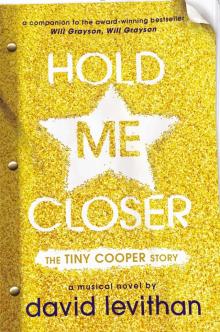 Hold Me Closer: The Tiny Cooper Story
Hold Me Closer: The Tiny Cooper Story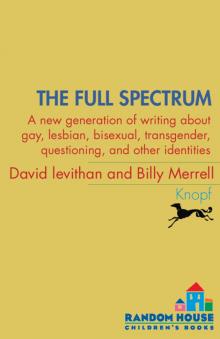 The Full Spectrum
The Full Spectrum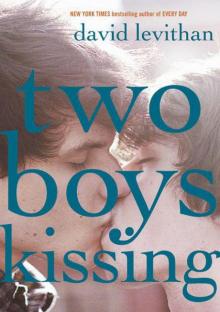 Two Boys Kissing
Two Boys Kissing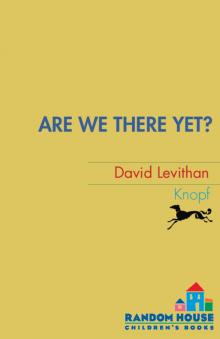 Are We There Yet?
Are We There Yet?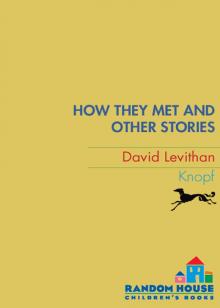 How They Met and Other Stories
How They Met and Other Stories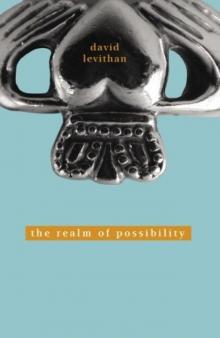 The Realm of Possibility
The Realm of Possibility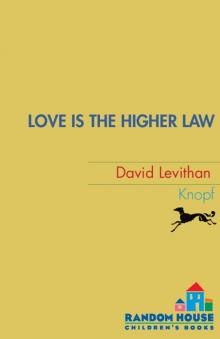 Love Is the Higher Law
Love Is the Higher Law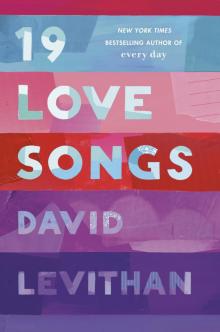 19 Love Songs
19 Love Songs Another Day
Another Day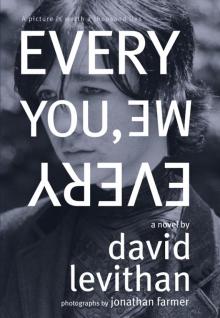 Every You, Every Me
Every You, Every Me Boy Meets Boy
Boy Meets Boy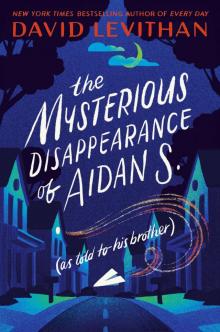 The Mysterious Disappearance of Aidan S. (as told to his brother)
The Mysterious Disappearance of Aidan S. (as told to his brother)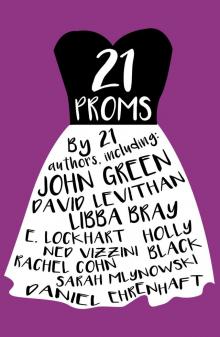 21 Proms
21 Proms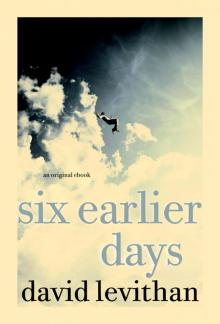 Six Earlier Days
Six Earlier Days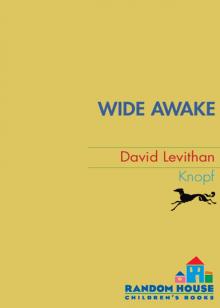 Wide Awake
Wide Awake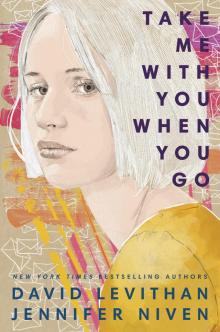 Take Me With You When You Go
Take Me With You When You Go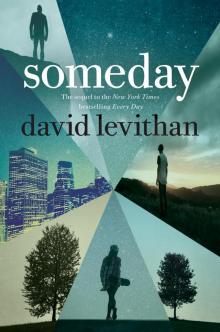 Someday
Someday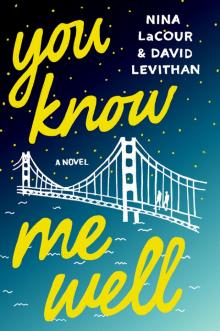 You Know Me Well
You Know Me Well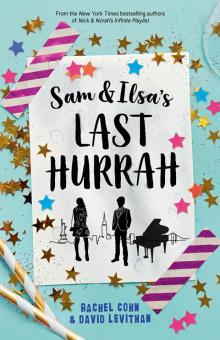 Sam and Ilsa's Last Hurrah
Sam and Ilsa's Last Hurrah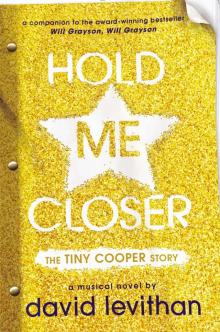 Hold Me Closer
Hold Me Closer Likely Story!
Likely Story!